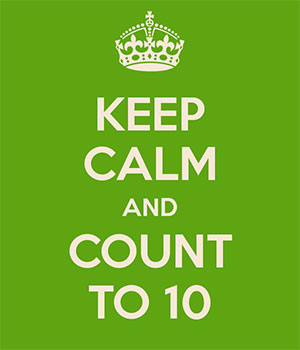Count to 10
Annie, a Project Manager for a Battle Ground-based commercial painting and decorating company told Session 5B of Turbo Leadership Systems’ Leadership Development Lab (LDL):

“On Friday morning of last week, I got a call at 5:30 AM from one of my employees complaining that another crew member didn’t show up at the job. I was enraged! I tried calling the worker multiple times to no avail. The job we are working on is extremely time crunched and on that particular Friday, we were only allowed on the site half of the day. Not to mention, our crew was already short-staffed. No doubt, everyone on my crew knew just how important this day was to the success of our project.

“When I finally got a call from him over 2 hours later saying he just woke up, I screamed, ‘Chad, I am so pissed off at you I can’t even talk right now! I will call you back later once I cool off!’ I waited until that evening to call him back. I asked him, ‘what is one of the first things I told you when I hired you?’ He regurgitated, ‘You have no tolerance for anyone being late for work.’
“This was the third time in 4 months that Chad had been late for work. I said, ‘That’s right! Three strikes and you’re out! So, if that’s what I said when I hired you and I don’t stick to it, what does my word mean to you and to the rest of our team? It means nothing.’
I let Chad go. He told me he respects me for sticking to my word and we ended the work relationship with no hard feelings.
“The lesson I learned is by not reacting “in the moment” but instead, taking a step back to think about things before addressing the issue makes for a much more meaningful and respectful conversation.

The action I call you to take when you’re mad: take a deep breath and walk away from the situation until you are able to address it in the right frame of mind.
The benefit you will gain is your relationships – both personal and professional – will improve dramatically and you will earn the respect of everyone around you.”
This is a story I have heard many times: the employee who shows up late or breaks some other non-negotiable standard over and over. Too often, the story is that no real consequences are experienced. If the people in your organization don’t experience negative consequences for unacceptable behavior, you will continue to get unacceptable behavior; it will increase in frequency and spread. As Annie has reminded us, we need to pause when we hold people accountable so that we are sure our response to their unacceptable behavior is acceptable.

 Larry W. Dennis, Sr. President,
Turbo Leadership Systems©
Larry W. Dennis, Sr. President,
Turbo Leadership Systems©

